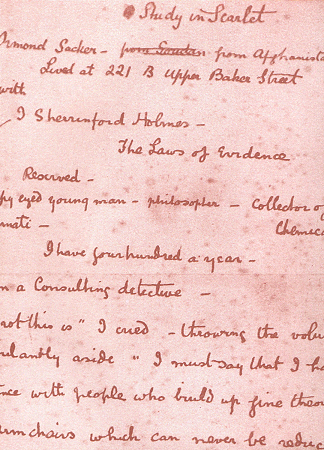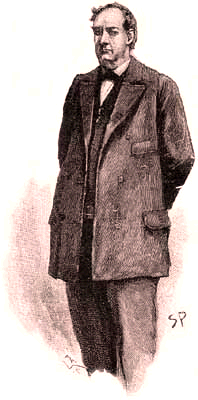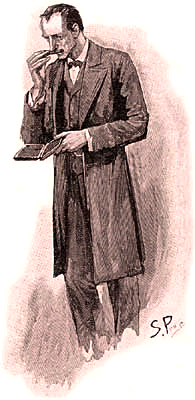
Publication for this GMD site © 06 October 2000
UPDATED 28 March 2003
(Editor's Note: Rebroadcast, redistribution, or reproduction of this document, in whole or in part, is prohibited without prior, written permission. For educational use only.)
 |
|---|
| A page of Sir Arthur Conan Doyle's first notes for The Study in Scarlet, his first book about his soon-to-be-famous detective. As you can see his original thoughts for names were "Ormond Sacker" and "Sherrinford Holmes"! |
A Tip Before Reading. Before you start reading this essay, I recommend reading Basic Sherlock Holmes: For You Beginners beforehand, because certain terminology I use which may escape non-Sherlockians and/or very new Basilian fans. Why? Because I'm not going insult your intelligence by explain every little thing if you already know it all, it's long-winded and unnecessary. In writing this, I will assume you know "The Basics". So enjoy!
Origin and History. In Arthur Conan Doyle's first writing notes in making his soon-to-be-world-famous crime stories, the originally intended name of his detective was Sherringford Holmes and his assistant Ormond Sacker. But Doyle later found that the name were too obscure and awkward, so he changed them the assistant's to John Watson because it accordingly dull, and his star Sherlock Holmes.
Theories in Sherlockia. I make what I can to read up on essays written by Sherlock Holmes scholars around the world. Sherlockians play a type of game known as Sherlockia, where the aim is that all the characters and even the events in The Sacred Writings are real. There are millions of Sherlockian essays if you care to read them, that play this game -- much like what I'm doing now in this essay:
 |
|---|
| Original illustration of Mycroft Holmes by Sidney Paget, first published in The Strand magazine. Less is known about Mycroft than Sherlock outside of The Canon. |
Vat's wong? Con't ou spull? In several Sherlockian references, there is a conflict over spelling the name, is it Sherringford? Or is it Sherrinford? The difference only in a letter "g". Accordingly, Doyle himself first spelled it Sherrinford in his notes, then later Sherringford, before changing it to Sherlock. Ever since, there has been conflict over the addition or subtraction of a single letter "g".
My Personal Need of Sherringford. If one has skimmed through my Pastiched GMD Cast list. There is a character whom is explained as Basil's elder brother, who is the equivalent of Mycroft Holmes (Sherlock Holmes' elder brother). Since his creation, for the longest time, he was know only as Basil's Brother; he had NO NAME whatsoever for over two years, because it was uncertain if the younger Basil even had a Christian name! And after two years, I finally got sick and tried of called my character "Hey you", therefore as a result, I went into some thinking and I figured Sherringford Basil would be perfect to use.
What's In A Name? I actually placed in the effort of searching for the meaning of their eccentric names, just for fun. Everyone usually likes to know what their name means and/or translates to.
 |
|---|
| Original illustration of Sherlock Holmes by Sidney Paget, first published in The Strand magazine. Doyle orginally wanted Walter Paget as the illustrator, but the letter went to the wrong Paget brother! Sidney used his brother Walter as his model for The Great Detective. |
Oh, if you are curious to the meaning of Brynna, Basil's sister according to the Eve Titus' Wild West novel, it is an Angelicised spelling of the Gaelic Brianna for "exalted and high minded." (And if you are wondering what I do with Brynna in my pastiches, I unfortunately had her pass away during Sherringford's and Myerricroft's childhood. She was probably six or seven when she passed away. This does not apply to other fanfictional writings, just mine.)
Sherringford Basil vs. Basil of Baker Street. Yet there is the question of the Basil of Baker Street title? Why would they call him Basil of Baker Street instead of Mr. Sherringford Basil?
Etiquette - Forms of Address. When one encounters both brothers at the same time, how do you adress them? Simple! You address them both as Mr. Basil -- there is NO way one should address them solely Mr. Myerricroft or Mr. Sherringford -- that's reserved for women. For unmarried daughters or sister, you properly address the eldest with Miss and the family's surname; the other daughters or sisters will be addressed by their first name. For sons and brothers, this doesn't exist. You address BOTH as Mr. Basil. Facing the brother which one wishes to address assists in confusion is best, or one could simply address them fully as Mr. Myerricroft Basil and Mr. Sherringford Basil to avoid confusion.
 |
|---|
| Original illustration of Basil of Baker Street by Paul Galdone from the first Basil of Baker Street book by Eve Titus. |
Links to Character Biographies.
References Used: